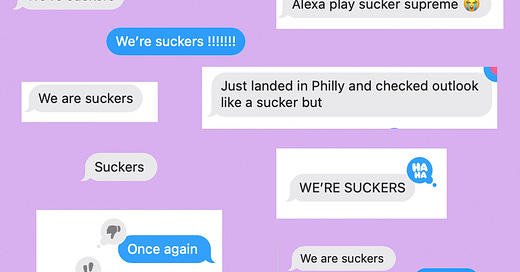Hi again.
If you’re new here: Hello and welcome! I am deeply grateful for the shoutouts I got in Josh Terry’s wonderful No Expectations newsletter and Lars Gotrich’s always-delightful Viking’s Choice newsletter, which (I think!) brought a number of you here. Thanks for subscribing. Constellations is my little newsletter that goes out once a month, on the 24th. (That’s today!) If you want to read the zine that Lars mentioned, there’s more info about it here:
…and if you want to buy one, you can reply to this email & let me know. (If you didn’t receive this as an email but you still want a zine, leave a comment, I guess?) And if you bought a zine last month: Thank you! I’m so touched and delighted by your support! (If you bought a zine last month and still haven’t received it yet, also, please also let me know.) And now, on with the show, as it were…
***
Years ago, my friend E and I kept calling ourselves and each other one thing: suckers. It started at work, where some annoying and particular dynamics meant we found ourselves, day after day, month after month, overworked — picking up someone else’s slack, cleaning up someone else’s mess, and feeling guilty and frustrated whenever we tried to get a break from it. It was annoying and inconvenient and frequently felt unjust, but we did it, begrudgingly, anyway. Because it had to get done. Because we felt responsible. Because we cared about our work, believed in its mission. Because we’re suckers, I’d say.
We felt like suckers because we knew we should stand up for ourselves, or at the very least take the breaks we deserved. But we just couldn’t help ourselves. This is cringe behavior, embarrassing to admit, and not something I’d advocate anyone else do.1 But at least we had our solidarity, texting each other “i’m being such a sucker rn :(” back and forth, no explanation needed.
It goes without saying that we both loved the Rosie Tucker album Sucker Supreme that came out in 2021. I love Rosie’s music because their lyrics are so funny, and their singing voice is so sweet and conversational — it really hits a sweet spot for me. (I got into this album around the same time I got into Katy Kirby’s Cool Dry Place, and the two albums feel of a pair to me — two songwriters who are excellent at matching wordplay and twisty little melodies!) The title of the album comes from the song “Habanero,” where Rosie sings, “I smile while I suffer / Like a sucker supreme.” Yes, I thought when I heard it, that’s me, even though it’s (I think) a song about a romantic mismatch and I was applying it to being annoyed by an email job. (Rosie has a new album coming out next month called UTOPIA NOW!, by the way, which is really marvelous.)
There was a lot of internet discourse about being a sucker last week, thanks to an article in The Cut with an impeccable headline: The Day I Put $50,000 in a Shoe Box and Handed It to a Stranger. In case you haven’t read the article, allow me to tell you that the writer — a personal-finance columnist, no less! — got scammed out of an enormous amount of money through a series of psychologically manipulative phone calls. It ends with the writer handing a box full of cash to a stranger in a car, believing she is going to get the money back. She does not. A lot of people online were reposting the article, saying, That would never happen to me; I’d never fall for that! As in: I am not a sucker. I couldn’t imagine making such a claim. I’d read their tweets and think: I may be a sucker, but I try not to tempt fate.
Lately I’ve been calling myself a sucker whenever I get too swoony about stories of romance and desire, especially when they are dire or dramatic. It keeps happening, and it’s always surprising; I keep expecting a more critical and cynical lens to kick in. (As I’ve said before: I don’t consider myself a romantic!) When, in place of feeling a restrained cynicism, I find myself rooting for a good-old-fashioned love story, I make fun of myself a little bit: sucker!
I thought about this after reading Blake Butler’s Molly — a memoir about his relationship with his late wife and the aftermath of her death — not because of the book itself, exactly, but the conversations I had about it. It’s a complex and, at times, quite difficult book to read; he recounts their relationship conflict in great detail, eventually even using the word abuse to describe her treatment of him. He is unflinching in his depiction of Molly’s struggle with her mental health and his grief after her suicide. The book generated some controversy when it was published late last year — some of the drama was sensationalist tabloid inanity, but some of it was nuanced and sensitive, bringing up moral questions about what it means to write a book about a loved one after they are dead. I think a lot of these questions are worthwhile. But my first response to the book was not along any of those lines; it was, instead, to be deeply moved by the portrait it draws of devotion: that no matter the wretchedness of their conflict or the cruelty Molly could show Blake, he still focuses so much of his writing on the goodness in her. That a book about grief was, of course, at its core, a book about devotion — I was touched by that.
What made me make fun of myself a little was when I started talking about the book with friends who had also read it, and I realized how differently it had struck them; they had more to unpack about the author’s self-awareness, to put it mildly. They had zeroed in on moments in the text that had passed me by, ones that shifted the lens, letting leaks of something more complicated than pure devotion — self-interest or unkindness or entitlement, they might call it — into the frame.
(This was echoed in the most thoughtful reviews I read — like Jamie Hood’s review in Bookforum. There’s a moment where she references Butler’s belief that his late wife likely suffered from borderline personality disorder, for example — a diagnosis she did not receive in life — and the review side-eyes that claim with a careful criticality: “I confess…there are moments in Molly when I bristle against Butler’s pathologizing diagnoses,” she writes, “particularly as I read them within a historical context of medical and psychoanalytic misogyny. I am constitutionally troubled by instances in which women’s account(s) of themselves are undercut, repurposed, or otherwise repositioned as unreliable.” She says these repositionings, which she saw come up several times throughout the book, destabilized her reading of it.)
Hearing my friends’ opinions, their position of skepticism immediately seemed, to me, more intellectually rigorous than my obsession with devotion. Of course! But even though I immediately replied to them by saying totally, for sure, this is just me being a sucker…, I knew the term wasn’t quite right. Because “being a sucker” usually denotes falling for something, some trick someone else is playing, right? That’s not what happened here. (Nor is it usually what’s happening in my strange new turn towards romance.) It wasn’t even a smile-while-I-suffer situation. It wasn’t like I was seeing the image of love when it wasn’t there — it was more like I was seeing love so big it blotted out the rest of the picture.
But when I told another friend about being a sucker for love more generally, she said what I am really talking about is a general state of hopefulness — which I found charming, since that’s a state in which I don’t often find myself. She said: actually, the true sucker move is giving into cynicism or losing faith. She sent me a list of notes for an essay she is writing about hope, about optimism as a bulwark against oblivion, about treating yearning like a teacher. It’s all brilliant, and she’s right, of course. Sometimes it’s right to be a sucker for skepticism and sometimes it’s right to be a sucker for hope — different ways of being romanced by what I know and don’t know, what’s right in front of me and what might be possible in the future.
***
Here are some other things I have been consuming lately: two beautiful reflections on the meaning of writing from two newsletters I love: from Marianela D’Aprile and from Charlotte Shane; The Past Is Still Alive by Hurray for the Riff Raff; Forgot About Me by Pouty; Weird Faith by Madi Diaz, which I reviewed for Pitchfork; the movies Codependent Lesbian Space Alien Seeks Same and Poor Things; the play I Love You So Much I Could Die; a couple TikTok-free weeks (I deleted the app2) — I miss it more than I expected!; a small breakdown over the cost of COBRA health insurance; Hotline TNT and Wednesday live in Brooklyn; about twenty hours spent in southern Vermont — so delightful; a great dinner at My Thai Vegan Cafe in Boston; this interview about writing, parenting, taking acid, and considering eco-terrorism
***
This time last year I was: lying; and before that, revisiting seventh grade and writing about my dreams and loving my cactus flowers
***
Thanks for reading. Sending you a little hopefulness this month.
xo,
M
For the record: this is not to say that I always said yes to doing random extra work, or always went above and beyond, or never became an inconvenience to those around me. Obviously! I was the annoying one plenty of times! But there was this pattern that my friend and I found ourselves in for a particular stretch of time, and it made us feel like suckers.
I keep telling people I “gave up TikTok for Lent,” which is basically true, but makes me sound much more Catholic than I am






I know what you mean about being a sucker, but I think that framing is not that helpful. In the case of your job, it put the blame on you and your friend, rather than on the structure of the company where it belonged. And when you are deeply moved by something, even something sentimental, you’re being human above all, not a sucker. To me it sounds like negative self-talk, of which I’m not a fan!